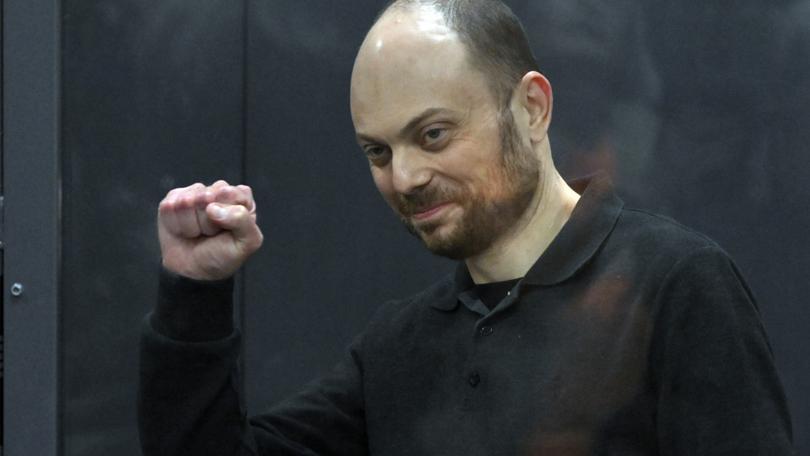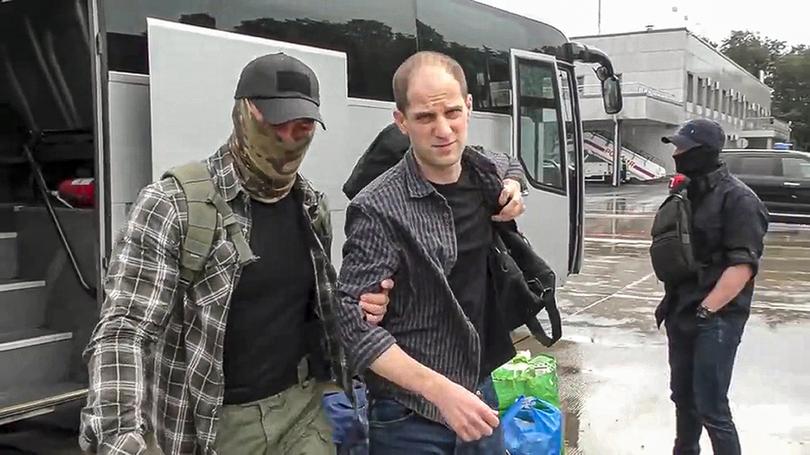Russian activist Vladimir Kara-Murz says Western governments should keep taking part in prisoner swaps
Vladimir Kara-Murza says Western governments should continue to free foreigners taken in hostage diplomacy cases.

Vladimir Kara-Murza says Western governments should continue to negotiate prisoner swaps like the one that secured his freedom, despite concerns that it encourages authoritarian governments to snatch innocent foreigners as bargaining chips.
Mr Kara-Murza, a political activist whose goal is to see democracy in Russia, was one of 16 people released from Russian prisons in August that made international headlines, as it centred around the release of the high-profile Wall Street Journal journalist Evan Gershkovich.
Gershkovich was snatched while on a reporting trip in Yekaterinburg, east of Moscow and jailed for spying for the CIA, in a trial dismissed as a sham.
Sign up to The Nightly's newsletters.
Get the first look at the digital newspaper, curated daily stories and breaking headlines delivered to your inbox.
By continuing you agree to our Terms and Privacy Policy.In reality, his arrest was used as a bargaining tool by the Kremlin to extract from Germany, with US mediation, the release of a convicted FSB killer Vadim Krasikov who was in prison for murdering a former Chechen rebel on the streets of Berlin in broad daylight.
This tactic of hostage diplomacy has been routinely used by Russia and its authoritarian partners Iran, China and also Myanmar to either exact political outcomes or release of their citizens convicted or detained in their other countries.
Australians have been involved in some of the most high-profile cases. For example, Australian academic Kylie Moore-Gilbert was released from Iranian prison in 2020 in exchange for three Iranians held in Thailand and Malasyia who were involved in a botched bomb plot in Bangkok.
Asked by The Nightly at his first solo press conference since being released from prison if his release only vindicated such tactics, Mr Kara-Murza said he accepted the “moral doubt” that his release involved because it was an unequal exchange to release innocents for Russian spies and a convicted murderer.
“I understand that this was a very, very difficult decision,” he said speaking at the Whitehall military think tank RUSI.
“But to me, democracy is about difficult decisions.
“Easy decisions are for dictatorships where everything is decided like this just on a whim,” he said, clicking his fingers in the air.
“And as a result of the exchange that happened on the 1st of August, 16 human lives, 16 human souls, were saved from the hell that is Russia’s modern-day gulag.
“Isn’t that worth releasing one assassin?”
A total of 24 people were released on August 1 in a complicated prisoner swap involving seven countries.

Mr Kara-Murza said neither he nor fellow Russian political figure Iylla Yashin were asked if they wanted to be freed as part of the deal and that he thought he was being led to his death when the guards came and told him to get ready.
Russian Opposition Leader Alexei Navalny was killed in prison earlier this year, but Germany is reported to have wanted Navalny released if they agreed to US pressure to give up Putin’s henchman.
Mr Kara-Murza said he told German Chancellor Olaf Scholz, who greeted him on the tarmac in Bonn immediately after he was flown from Russia, that the difficult decision had saved lives and underlined the very goal of democratic systems compared to authoritarian ones.
“We should continue doing this, the argument that such exchanges only encourage, you know, the taking of more prisoners - it’s a fallacious one,” he said.
“Putin’s going to take more prisoners, whatever, he’s already taking them.
“The only question is, will Western democracies be prepared to do something to save them?
“Or will they just let them die off and people … that’s the only question and so we must continue with these exchanges.”
Mr Kara-Murza said since his release after two years in solitary confinement in Siberia, he was now rallying Western leaders to support Ukraine.
“Vladimir Putin must not be allowed to win this war in Ukraine,” he said.
“More than that he must not be allowed to have a face-saving exit from this war.
“Because this man has been in power for 25 years and ever since he came to power he brought with him death, blood, suffering, pain, murder and war.
“This is who he is, he’s never going to change.”
He said if Putin was allowed to climb down from his war against Ukraine it would only lead to a new war or new international atrocity in a few years time.
“So the only strategic end game, the only strategic solution to this crisis is to have a different Russia.”
Earlier this year, Jen Daskal, deputy Homeland Security Adviser and deputy assistant to US President Joe Biden told the Centre for Strategic and International Studies that freeing Americans abroad didn’t lead to more cases.
“The evidence is not there that when we negotiate and we bring an American home, the country immediately goes back and picks up another American,” Ms Daskal said.
“It’s just not what happens.
“Obviously there have been some particular actors that have engaged in repeat bad actions, heinous actions.
“But as a whole, as a trend, it’s just not what we’re seeing.”
